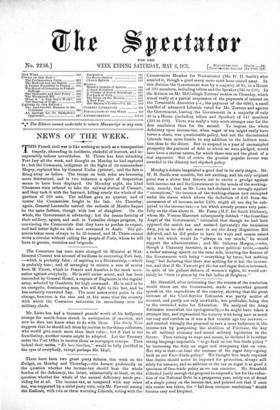Monday's debate languished a good deal in its early stages.
Mr. W. H. Smith was sensible, but not exciting, and his only original point was a clever hint thrown out to excite a grudge against both income-tax and the Government in the minds of the working- men, namely, that as Mr. Lowe had declared so strongly against "exemptions," the incomes of the workingrclaases now exempted under the clause which allows the deduction of £60 from the assessment of all incomes under £200, might all one day be sub- jected to the income-tax,—a tax which already presses very pain- fully on the class above it. Mr. Pease (ALP. for South Durham), whom Mr. Vernon Harcourt subsequently dubbed "the Guardian Angel of the Government," intimated that though he had both opposed the match tax and resisted (privately) the succession duty, yet as he did not want to see the Army Regulation Bill defeated, and he did prefer to have the ways and means raised by a tax which would be "always on our minds," he would support the administration ; and Mr. Osborne Morgan,—who, though a Chancery barrister, is a clever political rattle,—made a rather amusing speech on the same side, taunting the finance of the Government with being "everything by turns, but nothing long," but declaring that there was nothing for it but the income- tax, and that if Mr. Fawcett got the tea and sugar duties increased, in spite of his gallant defence of women's rights, he would cer- tainly be "torn to pieces by the fair ladies of Brighton."
































